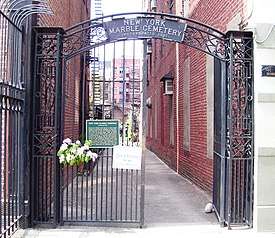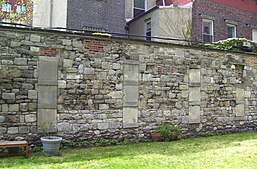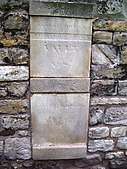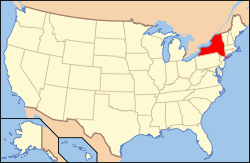New York Marble Cemetery
The New York Marble Cemetery is a historic cemetery founded in 1830, and located in the interior of the block bound by East 2nd and 3rd Streets, 2nd Avenue, and Bowery, in the East Village neighborhood of Manhattan, New York City. It is entered through an alleyway with an iron gate at each end, located between 41 and 43 Second Avenue. About 2,100 burials are recorded in the cemetery's written registers, most from prominent professional and merchant families in New York City.[2][3]
New York Marble Cemetery | |
 The entrance gate on Second Avenue (2011) | |
   | |
| Location | 41½ Second Avenue Manhattan, New York City, US |
|---|---|
| Coordinates | 40°43′32.25″N 73°59′27.5″W |
| Area | 0.5 acres (0.20 ha) |
| Built | 1830 |
| NRHP reference No. | 80004475[1] |
| Significant dates | |
| Added to NRHP | September 17, 1980[1] |
| Designated NYCL | March 4, 1969 |
The New York Marble Cemetery, which was New York City's first non-sectarian burial place, should not be confused with the nearby New York City Marble Cemetery one block east, which is entirely separate, and was established one year later. Both cemeteries were designated New York City landmarks in 1969,[4] and in 1980 both were added to the National Register of Historic Places.
History and description
The cemetery was founded as a commercial undertaking of Perkins Nichols, who hired two lawyers, Anthony Dey and George W. Strong, to serve as organizing trustees.[5][6] Recent outbreaks of yellow fever led city residents to fear burying their dead in coffins just a few feet below ground,[7] and public health legislation had outlawed earthen burials. Nichols intended to appeal to this market by providing underground vaults for burial.
Dey and Strong purchased the property on Nichols's behalf, on what was then the northern edge of residential development, on July 13, 1830, and Nichols had the 156 underground family vaults, each the size of a small room, constructed from Tuckahoe marble and laid out in a grid of six columns by 26 rows. He was then reimbursed from the sale of the vaults.[6][7]
Access to each pair of barrel vaults is by the removal of a stone slab set well below the grade of the lawn, which has no monuments or markers. Marble tablets mounted in the long north and south walls give the names of the original vault owners - though not the names of burials - and indicate the precise location of each corresponding underground vault. By 1997, parts of the North Wall had collapsed and other portions required steel buttresses. The weakened sections were dismantled and rebuilt to an eight-foot height and the buttresses removed as of November, 2018.
Nichols, Dey & Strong, and the subscribers applied to the New York State Legislature for a special act of incorporation, and this was granted on February 4, 1831.[8] According to a historical plaque on the cemetery's entrance gate "Descendants of the 19th century owners may still be buried here."[9]
Visiting
According to the cemetery's website, it is usually open on the fourth Sunday of the month from April to October, as well as on other weekends during the year. The Cemetery grounds are available for rental for appropriate events.[10][11]
Notable burials
- Gurdon Buck, pioneer plastic surgeon
- Aaron Clark, Whig mayor of New York City from 1837-39[6]
- Theodore Gordon, angler and sage of the Neversink River[7]
- John Wheeler Leavitt, prominent merchant, grandfather of artist Cecilia Beaux
- Pierre Lorillard II, tobacco tycoon
- Stevens T. Mason, first governor of Michigan, later reinterred in Capitol Park, Detroit[12]
- David Olyphant, a merchant involved in trade with China[6]
- Luman Reed American art patron
- Uriah Scribner, merchant, and Charles Scribner, publisher, later reinterred at Woodlawn [6]
- James Tallmadge, Jr., Congressman (1817–19) and New York University Council President[6]
- Benjamin Wright, Chief Engineer for the Erie Canal[13]
Prominent New York uppertens families such as the Beeckmans, Hones, Hoyts, Quackenbushes, Varicks and Van Zandts have vaults in the cemetery.[6][7]
References
Notes
- "National Register Information System". National Register of Historic Places. National Park Service. January 23, 2007.
- "List of Interments". New York Marble Cemetery. Retrieved 2011-10-07.
- "Workmen Reveal an Old Cemetery" (PDF). New York Times. 4 November 1907. Retrieved 8 November 2014.
- New York City Landmarks Preservation Commission; Dolkart, Andrew S.; Postal, Matthew A. (2009). Postal, Matthew A. (ed.). Guide to New York City Landmarks (4th ed.). New York: John Wiley & Sons. ISBN 978-0-470-28963-1., p.62
- Abstract of Title. Indenture form Henry & Marion Eckford to Dey & Strong, in trust. 13 July 1830.
- "NYCLPC Designation Report"
- Kelley, Tina (May 22, 2000). "Marble Walls, Roomy, But No Place to Live; Descendants Inherit a Cemetery Filled With History, but in Disrepair". The New York Times. Retrieved 2008-03-28.
- Abstract of Title. Memorandum of an Agreement contained in the Indenture Tripartite between Nichols, Dey & Strong, and the New York Marble Cemetery. 1 May 1832.
- Historical plaque, New York Marble Cemetery. Accessed 2011-05-01
- "Home Page". New York Marble Cemetery. Retrieved 2011-10-07.
- Beyer, Gregory (June 1, 2008). "A Hush-Hush Plan for a Not-So-Secret Garden". The New York Times. Retrieved 2011-10-07.
- "Take Gov. Mason's Body". The New York Times. June 3, 1905. Retrieved 2011-10-07.
- "Gravesites of Civil Engineers". ASCE Metropolitan Section. Retrieved 2016-11-12.
Further reading
- Brown, Anne Wright (2020). New York Marble Cemetery Interments, 1830–1937 (2nd ed.). Published by the author. ISBN 978-0-578-62029-9.
- Todd, Charles Burr (1907). In Olde New York: Sketches of Old Times and Places in Both the State and the City. New York: The Grafton Press. p. 29. OCLC 3985699.
External links
| Wikimedia Commons has media related to New York Marble Cemetery. |
- Official website
- New York Marble Cemetery, Second Ave at Find a Grave
- Forgotten NY
- New York Marble Cemetery Records at the New York Historical Society



